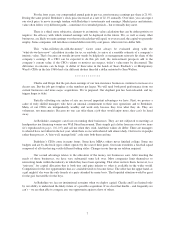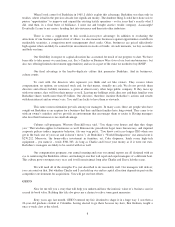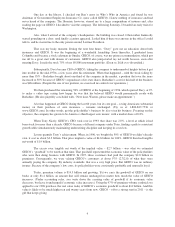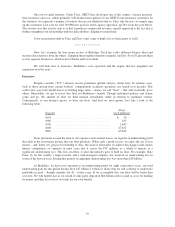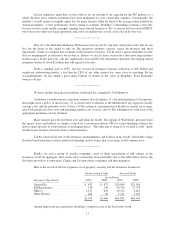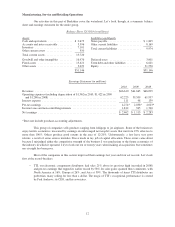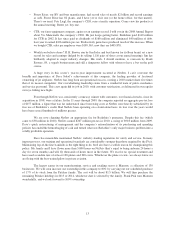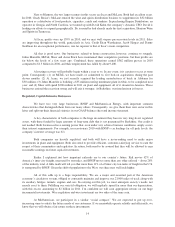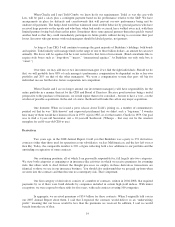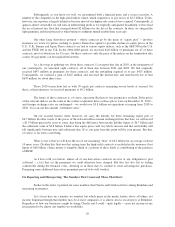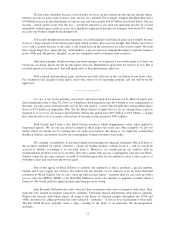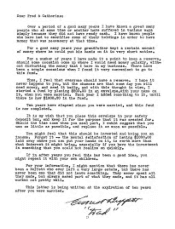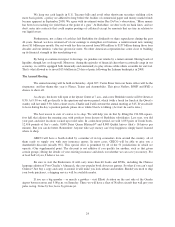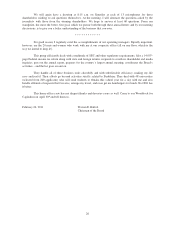Berkshire Hathaway 2010 Annual Report Download - page 19
Download and view the complete annual report
Please find page 19 of the 2010 Berkshire Hathaway annual report below. You can navigate through the pages in the report by either clicking on the pages listed below, or by using the keyword search tool below to find specific information within the annual report.
But a house can be a nightmare if the buyer’s eyes are bigger than his wallet and if a lender – often
protected by a government guarantee – facilitates his fantasy. Our country’s social goal should not be to put
families into the house of their dreams, but rather to put them into a house they can afford.
Investments
Below we show our common stock investments that at yearend had a market value of more than
$1 billion.
12/31/10
Shares Company
Percentage of
Company
Owned Cost * Market
(in millions)
151,610,700 American Express Company ........................ 12.6 $ 1,287 $ 6,507
225,000,000 BYD Company, Ltd. .............................. 9.9 232 1,182
200,000,000 The Coca-Cola Company .......................... 8.6 1,299 13,154
29,109,637 ConocoPhillips .................................. 2.0 2,028 1,982
45,022,563 Johnson & Johnson ............................... 1.6 2,749 2,785
97,214,584 Kraft Foods Inc. ................................. 5.6 3,207 3,063
19,259,600 Munich Re ...................................... 10.5 2,896 2,924
3,947,555 POSCO ........................................ 4.6 768 1,706
72,391,036 The Procter & Gamble Company .................... 2.6 464 4,657
25,848,838 Sanofi-Aventis .................................. 2.0 2,060 1,656
242,163,773 Tesco plc ....................................... 3.0 1,414 1,608
78,060,769 U.S. Bancorp .................................... 4.1 2,401 2,105
39,037,142 Wal-Mart Stores, Inc. ............................. 1.1 1,893 2,105
358,936,125 Wells Fargo & Company .......................... 6.8 8,015 11,123
Others ......................................... 3,020 4,956
Total Common Stocks Carried at Market .............. $33,733 $61,513
*This is our actual purchase price and also our tax basis; GAAP “cost” differs in a few cases because of
write-ups or write-downs that have been required.
In our reported earnings we reflect only the dividends our portfolio companies pay us. Our share of the
undistributed earnings of these investees, however, was more than $2 billion last year. These retained earnings
are important. In our experience – and, for that matter, in the experience of investors over the past century –
undistributed earnings have been either matched or exceeded by market gains, albeit in a highly irregular manner.
(Indeed, sometimes the correlation goes in reverse. As one investor said in 2009: “This is worse than divorce.
I’ve lost half my net worth – and I still have my wife.”) In the future, we expect our market gains to eventually at
least equal the earnings our investees retain.
************
In our earlier estimate of Berkshire’s normal earning power, we made three adjustments that relate to
future investment income (but did not include anything for the undistributed earnings factor I have just
described).
The first adjustment was decidedly negative. Last year, we discussed five large fixed-income
investments that have been contributing substantial sums to our reported earnings. One of these – our Swiss Re
note – was redeemed in the early days of 2011, and two others – our Goldman Sachs and General Electric
preferred stocks – are likely to be gone by yearend. General Electric is entitled to call our preferred in October
and has stated its intention to do so. Goldman Sachs has the right to call our preferred on 30 days notice, but has
been held back by the Federal Reserve (bless it!), which unfortunately will likely give Goldman the green light
before long.
17


